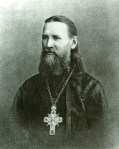Why is it, you ask, that one can pray for so many years with a prayer book, and still not have prayer in his heart? I think the reason is that people only spend a little time lifting themselves up to God when they complete their prayer rule, and in other times, they do not remember God. For example, they finish their morning prayers, and think that their relation to God is fulfilled by them; then the whole day passes in work, and such a person does not attend to God. Then in the evening, the thought returns to him that he must quickly stand at prayer and complete his evening rule. In this case, it happens that even if the Lord grants a person spiritual feelings at the time of the morning prayer, the bustle and business of the day drowns them out. As a result, it happens that one does not often feel like praying, and cannot get control of himself even to soften his heart a little bit. In such an atmosphere, prayer develops and ripens poorly. This problem (is it not ubiquitous?) needs to be corrected, that is, one must ensure that the soul does not only make petition to God when standing in prayer, but during the whole day, as much as possible, one must unceasingly ascend to Him and remain with Him.
In order to begin this task, one must first, during the course of the day, cry out to God more often, even if only with a few words, according to need and the work of the day. Beginning anything, for example, say ‘Bless, O Lord!’ When you finish something, say, ‘Glory to Thee, O Lord’, and not only with your lips, but with feeling in your heart. If passions arise, say, ‘Save me, O Lord, I am perishing.’ If the darkness of disturbing thoughts comes up, cry out: ‘Lead my soul out of prison.’ If dishonest deeds present themselves and sin leads you to them, pray, ‘Set me, O Lord, in the way’, or ‘do not give up my feet to stumbling.’ If sin takes hold of you and leads you to despair, cry out with the voice of the publican, ‘God, be merciful to me, a sinner.’ Do this in every circumstance, or simply say often, ‘Lord, have mercy’, ‘Most Holy Theotokos save us”, ‘Holy Angel, my guardian, protect me’, or other such words. Say such prayers as often as possible, always making the effort for them come from your heart, as if squeezed out of it. When we do this, we will frequently ascend to God in our hearts, making frequent petitions and prayers. Such increased frequency will bring about the habit of mental conversation with God.










